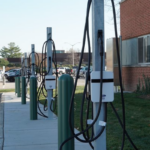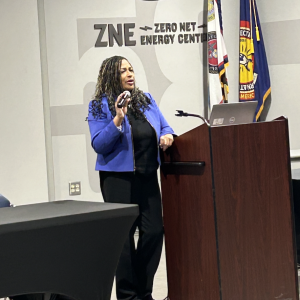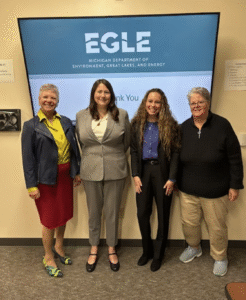
- Kim Kisner
- Business
- 01/31/2023
MSU & Domino’s Pizza Among Participants. Jeff Myrom of Consumers Energy Adam Lawver, of MSU Share More

Consumers Energy launched its PowerMIFleet program 19 months ago to augment its existing PowerMIDrive.
The latter program, launched in 2019, is targeted to smaller users and offers lower electric rates for off-peak charging for drivers and will provide rebates for residential, business, and public charging stations. More than 2,700 have been granted so far.
PowerMIFleet was launched in mid-2021 to build on that program by connecting businesses, large institutions, local governments, and school bus fleets with planning resources, expert guidance, and financial incentives to easily and cost-effectively transition to electric vehicles.
One of those large institutions, Michigan State University, is deep in the throes of transitioning 369 vehicles in its fleet of 1,200 internal-combustion vehicles to electric vehicles over the next decade and is working with Consumers Energy and the PowerMIFleet program to do so.
SBN Detroit spoke with two individuals deeply involved in MSU’s process, beginning with Jeff Myrom, Consumers Energy director of electric transportation customer programs, and Adam Lawver, director of Campus Services Infrastructure Planning and Facilities at Michigan State University, to gain insights into the process and how it works for Michigan businesses.
Q: Jeff, first tell us about the PowerMIFleet program.
Myrom: PowerMIFleet is a program designed to help business owners, municipalities, and educational institutions charge off-peak to reduce operating costs, eliminate emissions, and simplify vehicle maintenance by transitioning to electric vehicles.
This is a program for those looking to electrify multiple vehicles and potentially a variety of vehicle classes. This, along with PowerMIDrive, is aimed at gaining insights and learnings and then sharing those learnings with different sectors so we can optimize success in the future, and it supports the statewide goal of having 2 million EVs on our state roads by 2030.

Q: How long have these programs been in existence?
Myrom: PowerMIDrive has been in place for a little over three years. We are getting ready to convert the residential portion of this pilot to a permanent program.
PowerMIFleet launched in June of 2021 and has been so successful that it’s now fully subscribed.
Q: What is involved in the PowerMIFleet Pilot Program?
Myrom: Essentially there are three phases.
In this first phase, we are working with fifty customers across a wide geographic base within different industries and sectors. We conduct full assessments regarding their fleets and then develop a five-year plan for conversion and infrastructure. This longer-term plan allows us to build for the future now versus having multiple infrastructure upgrades over time.
In Phase Two we move forward with EV infrastructure development and the purchase cycle begins for the customer.
Phase Three involves taking a look at the actual experience with electrification to see if the infrastructure is adequate and circling back on lessons learned. For PowerMIFleet, this will take place in 2024.
Q: Who are you working with through PowerMIFleet in addition to MSU?
Myrom: We are currently working with over 50 customers, including several school districts. For example, Jackson Public Schools are looking to acquire 21 electric school buses. Homer Community School District is bringing on seven electric buses.
We are working with Domino’s Pizza on their rollout of 800 GM Chevy Bolt electric vehicles now.
We will publish our lessons learned from the vehicle electrification assessments starting in Q1 of 2023 and move from there.
Q: What challenges do you face?
Myrom: Vehicle availability and costs are a challenge. We recognize that until the supply chain is improved this will be the case.
Another potential challenge for those with large fleets is adopting time-of-use rates. Usage across the state is highest between 2 p.m. and 7 p.m. We are offering several different time-of-use options to minimize costs for businesses and help alleviate this challenge.

A good example of this is the work we are doing with Michigan State University. The PowerMIFleet program is providing rebates to MSU toward their charger installation costs, and we’ve supported the grid upgrades needed, as they prepared to take delivery of forty new EVs in September. Michigan State University is clearly a leader in fleet electrification, and one of the first movers in the PowerMIFleet pilot. Partnering with a leading educational institution like Michigan State University is a real boost to our fleet pilot learnings.
Q: Adam, what should we know about your conversion to electrification with Consumers Energy and PowerMIFleet?
Lawver: As part of our strategic plan goal of achieving climate neutrality by 2050 and reducing greenhouse gas emissions by 50% from its 2010 baseline, we are converting 369 internal combustion engine vehicles to fully electric vehicles over the next decade.
The conversion will decrease the university’s overall carbon footprint by 18,945 metric tons of carbon dioxide long-term – the equivalent of planting 312,584 trees.
In September 2021, we connected with Consumers and its PowerMIFleet program. Together we assessed our 1,200 vehicles and built fleet electrification roadmap.
Now, one year later we’ve received all 40 vehicles of the initial order and are in process of connecting charging stations.
Q: What manufacturers are you working with to build your fleet?
Lawver: We selected different types and manufacturers, according to what they’d be used for. Some vehicles are used to move people short distances, some are utility vehicles, some are used by staff to travel around the state for meetings, and so forth, so they all have different uses and needs.
So far, we have purchased a combination of Ford E-Transit Vans, Ford F150 Lightening Electric Trucks, Ford Mustang Mach-E’s,Chevy Bolts, and Tesla Model 3s.
Q: What can businesses learn from your current experience of electrification and working with PowerMIFleet?
Lawver: I think small businesses with a few delivery vans up to entities with large fleets would benefit from completing a fleet analysis and considering electrification.
I think you first need to look at the total cost of ownership of your vehicles. Each business owner needs to assess that and evaluate it over their fleet and see if there is a good alternative to convert to decrease their carbon footprint.
Then, build a roadmap for the next five to ten years.
Q: How do you think the electrification of your fleet impacts the community – including businesses in the surrounding area?
Lawver: MSU is a testbed for new technology. When it comes to EV strategy and charging stations it makes sense for an institution like ours to test and evaluate these technologies and many others in the mobility field.
Our College of Engineering is partnering with our infrastructure, planning, and facilities team to review the data generated by the first 40 vehicles and help inform our future roadmap for fleet electrification. Anyone interested in our research or other fantastic mobility-related research can go to mobility.msu.edu to learn more.
Also, within the College of Engineering Design Day program we connect companies with students to solve real-world problems through Capstone Projects. So, if a company is looking to electrify ten vehicles, for example, students can work on this problem/opportunity and develop solutions and present them. The types of projects our students work on with companies are truly diverse – check out the most recent Design Day booklet here. This is a great way for businesses in Michigan to leverage our student and faculty talent and knowledge, while also making your company known to our students for potential career pathways.
Be sure to subscribe to our newsletter for regular updates on sustainable business practices in and around Detroit.
Kim Kisner
- All
- Business
- Community
- Education
- Events

Citizen Robotics is a Detroit-based nonprofit that advances the use of robotics and digital manufacturing in residential construction, focusing on improving productivity, sustainability, and long-term affordability. Best known for its early work in 3D-printed housing, it explores how alternative construction methods and new financial models can reduce material waste, lower lifetime operating costs, and enhance the resilience of homes. SBN Detroit interviewed Tom Woodman, founder and president of...

Detroit-based OneSix Energy is a clean-energy technology company focused on advancing a lower-carbon approach to hydrogen production. Headquartered at Newlab in Detroit, the startup is developing a proprietary methane pyrolysis system designed to produce hydrogen without carbon dioxide emissions, while also generating solid carbon as a co-product. SBN Detroit interviewed with cofounder Stefan Sysko about the company’s origins, its approach to hydrogen production, and why Detroit is positioned...

Regina Strong serves as Michigan’s first Environmental Justice Public Advocate, leading the state’s Office of the Environmental Justice Public Advocate. Her role focuses on addressing environmental justice concerns raised by communities, helping residents navigate environmental systems, and working across state agencies to improve equity in environmental decision-making. SBN Detroit interviewed Strong about the challenges communities are facing across Michigan and what environmental justice work looks like in practice....







